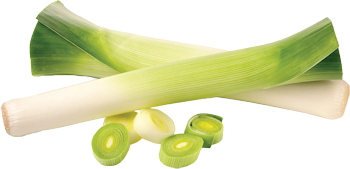|
Leeks contain
many noteworthy flavonoid anti-oxidants, minerals, and vitamins that have
proven health benefits.
Leeks are low in
calories. 100 g fresh stalks contain 61 calories. Further, their elongated
stalks provide good amounts of soluble and insoluble fibre.
Though leeks
contain proportionately less thio-sulfinites than that in garlic, they still
possess significant amounts of these anti-oxidants such as diallyl disulfide,
diallyl trisulfide and allyl propyl disulfide. These compounds convert to
allicin by enzymatic reaction when the stalk disturbed (crushing, cutting etc).
Laboratory
studies show that allicin reduces cholesterol production by inhibiting HMG-CoA
reductase enzyme in the liver cells. Further, it also found to have
anti-bacterial, anti-viral and anti-fungal activities.
Alicen also
decreases blood vessel stiffness by release of nitric oxide (NO); thereby bring
reduction in the total blood pressure. It also blocks platelet clot formation
and has fibrinolytic action in the blood vessels, which helps decrease overall
risk of coronary artery disease (CAD), peripheral vascular diseases (PVD), and
stroke.
Leeks are great
source of minerals and vitamins that are essential for optimum health. Their
leafy stems indeed contain several vital vitamins such as pyridoxine, folic
acid, niacin, riboflavin, and thiamin in healthy proportions. 100 g fresh
stalks provide 64 µg of folates. Folic acid is essential for DNA synthesis and
cell division. Their adequate levels in the diet during pregnancy can help
prevent neural tube defects in the new-born babies.
In addition,
leeks are one of the good source of vitamin A (1667 IU or 55% of RDA per 100 g)
and other flavonoid phenolic anti-oxidants such as carotenes, xanthin, and
lutein. They also have some other essential vitamins such as vitamin C, K, and
vitamin E. Vitamin C helps body develop resistance against infectious agents
and scavenge harmful, pro-inflammatory free radicals.
Further, its
stalks have small amounts of minerals such as potassium, iron, calcium,
magnesium, manganese, zinc, and selenium.
Cardiovascular
Support: Leeks
contain important amounts of the flavonoid kaempferol, which has repeatedly
been shown to help protect our blood vessel linings from damage, including
damage by overly reactive oxygen molecules. Interestingly, one of the
mechanisms involved in this blood vessel protection may involve increased
production of nitric oxide (NO), a naturally occurring gas that helps to dilate
and relax the blood vessels, as well as decreased production of that asymmetric
dimethylarginine (ADMA), a substance that blocks production of NO.
Often overlooked in leeks is their important
concentration of the B vitamin folate. Folate is present in leeks in one of its
bioactive forms (5-methyltetrahydrofolate, or 5MTHF) and it is present
throughout the plant (including the full leaf portion, not only the lower leaf
and bulb). While it's true that we still get about 50% more 5MTHF from the bulb
than the leaves, this distribution of folate throughout the plant makes leeks a
cardioprotective food from top to bottom. (Folate is a key B complex vitamin
for supporting our cardiovascular system, because it helps keep our levels of
homocysteine in proper balance. Excessively high levels of homocysteine are a
risk factor for many cardiovascular diseases.)
Also present in leeks are impressive
concentrations of antioxidant polyphenols. These polyphenols play a direct role
in protecting our blood vessels and blood cells from oxidative damage. The
total polyphenol content (TPC) of leeks averages about 33 milligrams of gallic
acid equivalents (GAE) per 100 grams of fresh edible portion (FEP). By
contrast, the TPC of red bell peppers averages 27 milligrams; cherry tomatoes,
24 milligrams; and carrots, 10 milligrams. So even though leeks are less
concentrated than some of their fellow allium vegetables in terms of total polyphenols
(garlic provides about 59 milligrams GAE/100g FEP, and onions provide about 76
milligrams), they are still a highly valuable food in terms of these
phytonutrient antioxidants and provide us with important cardiovascular
benefits for this reason.
Vision: Consume leeks as
a source of lutein and zeaxanthin. These compounds contribute to healthy
eyesight. They protect your eye tissues from oxidative damage -- harmful
oxidation of your DNA and cell membranes -- by filtering out harmful light rays
as they enter your eye. The American Optometric Association also notes that
lutein and zeaxanathin, when consumed in adequate amounts, protect you from
cataracts and age-related macular degeneration. The AOA recommends 12
milligrams of lutein and zeaxanthin daily to reap these benefits, and each cup
of leaks contains 1.7 milligrams, or 14 percent of this goal.
Anti-cancer
properties: Leeks are a good source of allyl sulphides
which have been shown to reduce the risk of developing certain cancers,
particularly stomach, prostate, and colon cancer.
Fight infections: Leeks also act
as an antiseptic agent, which help the body fight against infection. You may
apply leek extract on a wound to prevent the infection.
Improve digestive
health: Leek is
one of the few foods that contain prebiotics, a type of good bacteria, which is
necessary for a better nutrient absorption. It eliminates noxious waste matter
in the body, stimulates peristaltic action and secretes digestive fluids,
thereby improving digestive function.
Maintain healthy
cholesterol levels: A regular intake of leeks has
been associated with the decrease in bad (LDL) cholesterol and raise in the
level of good (HDL) cholesterol.
Good for pregnant
women: Leek is very essential for pregnant women as they contain
considerable amount of folate. The folate consumption during pregnancy has been
shown to reduce the risk of neural tube defects.
Strengthen bones: Leeks are a rich source of calcium and magnesium. The calcium
along with magnesium is essential for bone health, helping to convert vitamin D
into its active form in the body and thus strengthen the bones.
Prevent Anaemia: Due to its iron content, leeks can also help in preventing
various types of anaemia, particularly iron-deficiency anaemia. It is also rich
in Vitamin C, which can help in better absorption of iron in the body.
|

